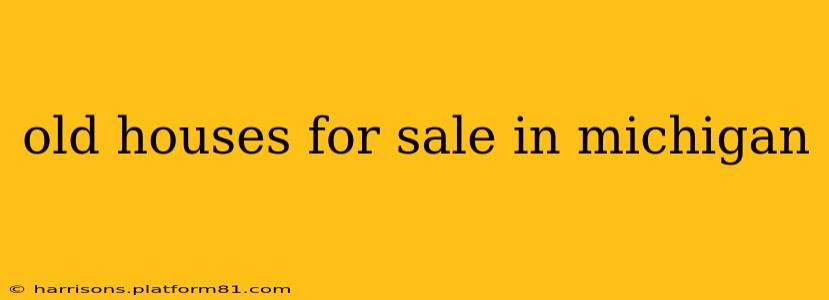Michigan, with its rich history and diverse architectural styles, offers a captivating market for those seeking charming old houses. From Victorian elegance in Ann Arbor to the Craftsman bungalows of Grand Rapids, the state boasts a treasure trove of historic properties waiting to be discovered. This guide explores the unique aspects of buying an older home in Michigan, highlighting considerations and resources to help you find your dream property.
What Makes Buying an Older Home in Michigan Unique?
Purchasing an older home in Michigan presents a unique blend of challenges and rewards. The age and character of these properties contribute to their charm, but also require careful consideration. Factors such as potential maintenance needs, historical preservation regulations, and the availability of skilled contractors familiar with older construction techniques should all be factored into your decision-making process.
Finding the Right Property: Where to Start Your Search?
Several online resources and local networks can assist in your search for old houses for sale in Michigan. Websites specializing in real estate, such as Zillow, Realtor.com, and Trulia, are excellent starting points. Filtering your search by age, architectural style, and location within Michigan will help narrow down your options. Don't underestimate the power of local real estate agents specializing in historic properties; their expertise and network can prove invaluable.
What are the Common Architectural Styles Found in Michigan's Older Homes?
Michigan's architectural landscape is incredibly diverse, reflecting the state's rich history and varied influences. You'll find examples of:
- Victorian Era Homes (1837-1901): Characterized by intricate detailing, ornate trim, and a variety of styles like Queen Anne, Stick, and Italianate.
- Craftsman Bungalows (1905-1930): Known for their low-pitched roofs, exposed beams, and built-in cabinetry.
- Colonial Revival Homes (1880-1950s): Inspired by American colonial styles, these homes feature symmetrical facades, columns, and simple detailing.
- Prairie School Homes (1900-1930): Defined by horizontal lines, low-pitched roofs, and open floor plans.
- Farmhouses: Representing a wide range of styles and eras, from simple vernacular designs to more elaborate farmhouse variations.
What are the Potential Challenges of Owning an Older Home in Michigan?
While the charm is undeniable, owning an older home requires careful consideration:
- Maintenance and Repairs: Older homes often require more maintenance than newer constructions. Expect potential issues with plumbing, electrical systems, roofing, and foundations.
- Unexpected Costs: Unforeseen repairs can arise, potentially exceeding your budget. Thorough inspections are crucial before purchasing.
- Finding Skilled Contractors: Locating contractors experienced in working with older homes can be challenging. Networking with local historical societies or real estate agents can help.
- Insurance Costs: Insurance premiums for older homes might be higher due to the increased risk of damage or repairs.
How Can I Find a Qualified Home Inspector for an Older Home?
Finding a home inspector with experience in older homes is crucial. Look for inspectors who have certifications and experience working with the specific architectural styles of your potential purchase. Ask for references and check online reviews. A detailed inspection can identify potential problems before you commit to the purchase, saving you significant financial and emotional stress.
What are the Potential Costs Associated with Renovating an Older Home in Michigan?
Renovating an older home can be expensive, and costs vary widely depending on the scope of work and the materials used. Develop a realistic budget that accounts for potential surprises and unexpected repairs. Research local contractor rates and material prices before embarking on any renovations. Prioritize essential repairs over cosmetic upgrades, focusing on structural integrity and safety first.
Are there Any Tax Benefits or Incentives for Owning Historic Homes in Michigan?
While specific tax benefits vary by municipality and the home's historical designation, some local governments offer tax incentives for the preservation of historic homes. Contact your local assessor's office or historical society for information on potential programs available in your area.
This comprehensive guide aims to equip you with the knowledge and resources necessary to navigate the exciting, yet challenging, journey of finding and purchasing an old house in Michigan. Remember that thorough research, careful planning, and the assistance of experienced professionals are essential elements for a successful and rewarding experience.
